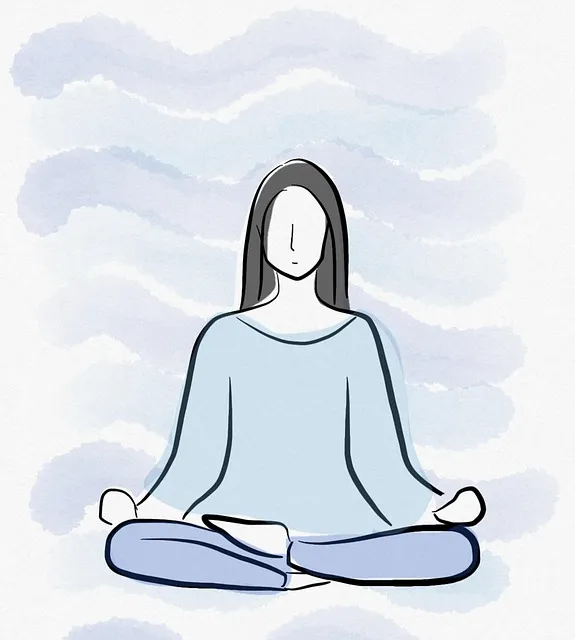Mindfulness meditation, popularized by centers like Lakewood Kaiser Permanente Mental Health Access Center, offers stress reduction, anxiety relief, and depression management. It promotes self-acceptance, reduces mental illness stigma, improves focus, sleep, and quality of life. Creating a personalized home meditation space with cultural elements supports practice. Diaphragmatic breathing activates relaxation responses. Daily mindfulness integration through techniques like breath awareness enhances emotional regulation and overall well-being.
At Lakewood Kaiser Permanente Mental Health Access Center, we believe mindfulness meditation is a powerful tool for enhancing well-being. This practice guides individuals to focus on the present moment, cultivating awareness and calmness. Our article offers comprehensive guidance on unlocking the benefits of mindfulness meditation. From understanding its profound effects to setting up a peaceful home space, learning effective breathing techniques, and integrating mindfulness into daily life, we provide practical tips tailored for your convenience.
- Understanding Mindfulness Meditation Benefits
- Setting Up Your Meditative Space at Home
- Techniques for Effective Mindful Breathing
- Incorporating Mindfulness into Daily Routine
Understanding Mindfulness Meditation Benefits

Mindfulness meditation has gained significant traction as a powerful tool for enhancing mental wellness, thanks in part to centers like Lakewood Kaiser Permanente Mental Health Access Center that prioritize mental health access. By focusing on the present moment and cultivating non-judgmental awareness, this practice offers numerous benefits. Regular mindfulness sessions can reduce stress, anxiety, and even symptoms of depression, fostering a deeper sense of calm and emotional stability.
Beyond individual well-being, mindfulness meditation plays a crucial role in Mental Illness Stigma Reduction Efforts. It encourages self-acceptance and compassion, helping individuals to view their experiences and emotions with clarity rather than shame or fear. Moreover, the practice can enhance overall quality of life, improve concentration and attention span, and even contribute to better sleep patterns—all of which are essential components of a healthy lifestyle promoted by healthcare providers like those at Lakewood Kaiser Permanente.
Setting Up Your Meditative Space at Home

Creating a dedicated space for mindfulness meditation at home can significantly enhance your practice and overall mental well-being. Start by designating a quiet area in your residence that feels serene and free from distractions. This could be a corner of your bedroom, a small study, or even a cozy nook in your living room. At the Lakewood Kaiser Permanente Mental Health Access Center, they emphasize the importance of personalizing your meditative environment to foster a deeper connection with yourself.
Consider adding elements like soft lighting, comfortable seating, and soothing decor to create a tranquil atmosphere. Incorporate items that resonate with you culturally or inspire calmness. For instance, if certain scents evoke relaxation, use essential oils or incense. Similarly, healthcare professionals like those undergoing Kaiser Permanente mental health access center’s Cultural Competency Training can benefit from creating an environment that supports their personal practices, especially when integrating cultural aspects into mood management strategies.
Techniques for Effective Mindful Breathing

Breathing is a fundamental aspect of mindfulness meditation and an accessible tool for managing stress and mood. At the Lakewood Kaiser Permanente mental health access center, experts emphasize the power of conscious breathing to calm the mind and body. One effective technique is diaphragmatic breathing, also known as belly breathing. To practice this, find a comfortable seated position, close your eyes, and place one hand on your chest and the other on your abdomen. Inhale slowly through your nose, allowing your abdomen to rise, and then exhale gently through your mouth, contracting your abdominal muscles to push out the air. This slow and deliberate breathing activates the parasympathetic nervous system, promoting relaxation and reducing stress response.
Additionally, mindful breathing exercises can involve focusing on each inhale and exhale, observing the sensation of air entering and leaving your body. This simple act of awareness helps to anchor you in the present moment, quieting racing thoughts and cultivating a sense of calm. For those seeking crisis intervention guidance, mindfulness meditation with a focus on breath can provide immediate relief, offering a space for self-regulation and emotional stability during challenging times.
Incorporating Mindfulness into Daily Routine

Incorporating mindfulness into your daily routine can be a transformative practice for mental health and overall well-being. At the Lakewood Kaiser Permanente Mental Health Access Center, we emphasize the accessibility and benefits of this approach as part of our holistic treatment methods. Mindfulness meditation is not about finding quiet moments in a chaotic world but rather cultivating awareness and presence during everyday activities. It’s a skill that can be developed over time, allowing individuals to become more attuned to their thoughts, emotions, and bodily sensations without judgment.
By dedicating just a few minutes each day, you can start to integrate mindfulness into your routine. Simple practices like mindful breathing exercises or body scans can help ground you in the present moment. Consider using tools like a mental wellness journal to reflect on your experiences and track progress. Additionally, engaging in mood management techniques through mindfulness can enhance emotional regulation and improve social interactions, as it promotes better understanding of both yourself and others—a key aspect of social skills training.
Mindfulness meditation, as guided by resources like the Lakewood Kaiser Permanente Mental Health Access Center, offers profound benefits for mental well-being. By creating a dedicated space, mastering breathing techniques, and seamlessly integrating mindfulness into daily life, individuals can experience reduced stress, improved focus, and increased overall happiness. Embrace these practices to unlock a calmer, more balanced you.






